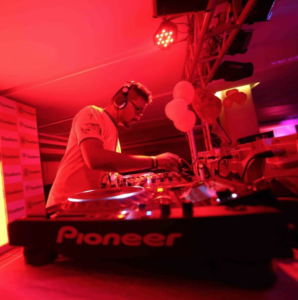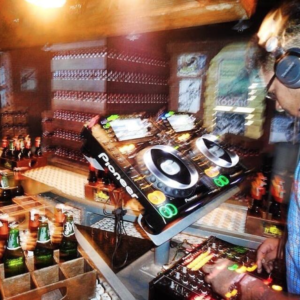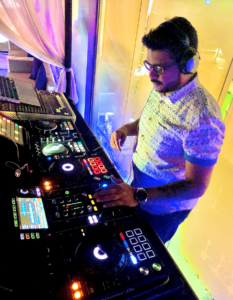
If you’re planning on traveling overseas to find DJ work anytime soon, you might want to pay attention.
Before we jump in…
Back in 2011-2012, I had some regular slots at a few club-orientated bars Kochi, India. Not only clubs, I used to be a DJ for many private events such as weddings, corporate events, what not!
Whilst they weren’t massive super DJing events or anything like that, they definitely weren’t shoe boxes, either. These events usualy would typically hold about 150 people.
Things would get very cheesy at times …which, considering I was always more of an underground house guy, I never saw coming.
Back then, I used to think of myself as a “commercial DJ” simply because the music I had to play was mostly commercial.
 I use the word ‘commercial’ in a very general sense to describe mainstream music. Whether that’s the current Number 1 in the charts or a 20-year-old classic. It’s music that people have generally heard before such as pop music, commercial dance (obviously), R&B, classic rock, 80s, 90s, and so on (I don’t want to avoid mallu songs, tamil dappankuthu songs, etc..).
I use the word ‘commercial’ in a very general sense to describe mainstream music. Whether that’s the current Number 1 in the charts or a 20-year-old classic. It’s music that people have generally heard before such as pop music, commercial dance (obviously), R&B, classic rock, 80s, 90s, and so on (I don’t want to avoid mallu songs, tamil dappankuthu songs, etc..).
By this definition, a commercial DJ could encompass mobile DJs, wedding DJs, and depending on the bar or club in question, any kind of ”tourist market DJ” — which is basically what I was!
You know the ones: the kind you’d typically find on the main strips in places like Ibiza, Soho Garden Dubai, and Xennya Terrace.
In my specific example, I was almost like a hybrid between a club DJ and mobile DJ. That is: although I was playing on the venues club gear (CDJs) in a club-like environment, depending on the crowd, I’d regularly morph into a mobile DJ – using the midi controllers and a Microphone more frequently whilst treating it more like a private party.
I suppose the official umbrella term for it these days would be ‘open-format’ DJ’ing.
So then…
When DJ’ing in any kind of commercially-orientated environment, playing what your audience wants to hear isn’t just important, it can be EVERYTHING!
Whilst smooth transitions are definitely a factor (obviously it’s not a good look if all your mixes sound like car crashes), it’s not something you want to get too bogged down with!
It’s not like an underground club where the audience has paid to get in and is committed to staying for the rest of the night, knowing roughly what to expect.
Because you have punters coming & going all the time, it’s largely YOUR responsibility as the DJ to make sure they have 2, 3, or 4 drinks, rather than just 1 and then leaving!
Especially when it’s still early doors (and the place is mostly empty), you might have to be a bit more flexible in taking requests …almost like a jukebox on occasions.
In this environment, you shouldn’t be afraid to jump in and out of genres to see how people react.
The crowd is going to expect a good dose of what they know, and they want to feel warm & fuzzy like they ‘know their shit’, and it’s your job to give them what they want.
 Whilst it might seem like an obvious one, I have to mention it:
Whilst it might seem like an obvious one, I have to mention it:
Especially for this kind of DJ’ing, the need to nurture an extensive and varied music collection is an absolute non-negotiable. At least if you want to stand out from the mediocre DJs that don’t!
If you haven’t built your collection with love from the ground up, you could come unstuck navigating through it in a pressurized live environment …particularly when you’re getting smashed with song requests.
And besides, it’s going to make you a much better DJ if you can find the perfect tune for that perfect moment …and quickly!
While I was the resident DJ of Xennya Terrance, Holiday Inn, Al Barsha, Dubai, I used to get a lot of song requests from tourists. There were songs that were totally new to me. I used to arrange them in folders based on the language, genre, and country of origin so that at a later point in time I could play the same songs when similar tourists are in the club.
Have you ever found yourself DJ’ing at a house party where a party-goer tries telling you what to play?? You know the ones… the micro-manager types that clearly know everything about music!
They pester you, telling you to play what THEY want to hear — implying that it’s what everybody else will want to hear — ironically making things worse as they consume all of your thinking time between transitions.
I’ve had similar experiences as a commercial DJ. Your audience can be extremely impatient, and they’re not scared to tell you what they want and exactly when they want it!
In this environment (as much as I hate to say it), you WILL have to eat the occasional shit sandwich, so be prepared to bite your lip and be a professional when needs must. And remember it’s not all about you.
On the bright side, it’s a special treat when you do have the chance to slip into a more desirable genre. Especially if you’ve had to play some serious cheese for the last couple of hours.

As I mentioned earlier: As a commercial DJ (in my example), you’re directly responsible for keeping the punters in the venue for as long as possible.
I remember during a quiet spell in this one place when the European owner was in the bar. Every single track that I played was getting scrutinized because the bar was so quiet.
The bar manager would come over to me because the Europen owner was in his ear constantly and say things like ‘’play more cheese’’, or ‘’more R&B’’ – all because the owner didn’t approve of my warm-up house selection.
Seriously though, the place was freaking empty for god sake.
So what am I getting at? Well, if you’re one of the resident DJs and the bar is only averagely busy compared to the competition, it’s potentially your head on the chopping block – so remember to take nothing for granted!
Apart from having a great time and meeting loads of new people, as a commercial DJ, you’ll learn the fundamentals of what DJing is all about in a very short space of time.
You’ll become super-aware of your primary purpose every time you get behind the decks: to play great music that makes people want to dance!! As tempting as it sometimes is to drift into a musical comfort zone (for me, that basically meant less commercial stuff and more house music), you really have to ditch that ego at times, which becomes a skill in itself!
If you’re playing for most of the night, as I was, you’ll experience how to nurture the dancefloor from completely empty to ‘’jumpin’’’ … which is one of the best feelings in the world.
A “commercial” DJ is generally someone who plays well-known music that most people are familiar with, such as pop, commercial dance, R&B, classic rock, and hits from the 80s and 90s. While the term often brings to mind DJs at commercial clubs, it’s worth noting that a commercial DJ could also encompass open-format or special event DJs.
Reach out to me via Instagram @karanjcliff
About the Author, Karan Joseph Cliff is one of the mainstream DJs in Dubai.
DJ Karan Dubai